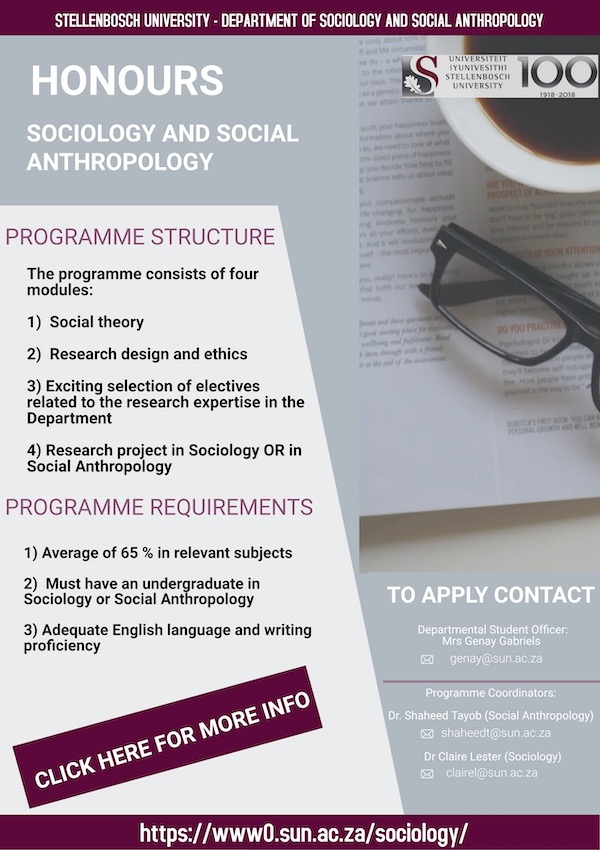Honours
Honours in Sociology or Social AnthropologyThe Honours programme offers students a firm foundation in the theoretical and methodological underpinnings of sociology and social anthropology. The one year post-graduate curriculum includes the study of anthropological and sociological theory, research methodology, and an independent research project.
Students interested in careers as academics, researchers, social and policy analysts, planners, developers, consultants, social workers, human resource managers, and communications, government and NGO officials will all benefit, as will individuals with a general interest in deepening and broadening their understanding of society and social dynamics.
Programme aims:
- To develop theoretical insights concerning questions of culture, identity, state formation, capitalist development, infrastructure, and material practice.
- To develop rigorous conceptual, methodological and writing skills;
- To develop and formulate an individual areas of research interest and expertise.
Here’s how it works…
Programme design
The honours programme runs on a full-time basis over a period of on calendar year. It includes regular in-person seminar style classes with experts in the field, as well as time for individual reading and research. The year-long program is divided into four quarters.
Quarter 1:
The first quarter is dedicated to the study of Social Theory under the guidance of Prof. Bernard Dubbeld.
Quarter 2:
Quarter two trains students in diverse methodological perspectives in sociology, anthropology and quantitative research.
Quarter 3:
Quarter three is the elective quarter. Students are invited to register for one elective out of a selection of exciting and relevant subjects. During 2022 the electives offered in the department include the following:
Elective 1: Critical Transformations: Public Sociologies and Anthropologies in a World of Crisis by Prof. Steven Robins. (MORE INFO)
Elective 2: Feminisms: Connecting global and local theories by Dr. Khayaat Fakier. (MORE INFO)
Elective 3: Critical Black Thought by Dr. Efua Prah.
Elective 4: Selected Readings in the Social Sciences by Prof. Bernard Dubbeld. (MORE INFO)
Electives are run as intensive reading seminars where critical reading and writing skills are developed and honed.
Quarter 4:
Completion of independent research and submission of research projects before the 1st November.
In order to qualify the program students are expected to have achieved an undergraduate average of 65% or above over their student career. The student will also be required to have majored in either sociology or social anthropology.
All applications are handled centrally by the Stellenbosch University central administration. The department does NOT deal with applications directly.
Please refer to this page for detailed steps on the application process:
http://www.sun.ac.za/english/pgstudies/Pages/How-to-apply.aspx .
For currently enrolled SU students, application information is available here:
http://www.sun.ac.za/english/pgstudies/Pages/Current-enrolled-SU-students.aspx
For the faculty application information page see here:
http://www.sun.ac.za/english/pgstudies/Pages/Arts/Faculty-of-Arts-and-Social-Sciences_closing-dates_Honours.aspx
For information on contact details and application deadlines see here: http://www.sun.ac.za/english/pgstudies/Documents/Curriculum_Master%20list/Arts%20and%20Social%20Sciences/Honours/BAHons%20(Social%20Anthropology).pdf
For information about Funding, please consult the following resources:
- Department Cilliers Bursary for STudenst in Financial Need (https://www0.sun.ac.za/sociology/students/funding/
- NRF Post-graduate scholarships https://www.nrf.ac.za/dsi-nrf-postgraduate-student-funding-for-the-2023-academic-year/
- Stellenbosch Postgraduate office (http://www.sun.ac.za/english/research-innovation/Research-Development/postgraduate-funding-support)
Closing Date for Applications •
South African students: Apply by 30 November of the preceding year.
International students: Apply by 31 August of the preceding year.
Please pay attention to application deadlines as no exception can be made for late applications.
The research project
The research project is examined by an internal examiner and moderated externally. Students choose their topics in consultation with the Department and work under the supervision of a member of the academic staff. The final 1.5 spaced project report is expected to be in the region of 10 000 – 12 000 words (maximum 15 000 words), excluding references.
For more information, please contact one of the programme co-ordinators:
Programme co-ordinators
Social Anthropology:
Dr. Shaheed Tayob
shaheedt@sun.ac.za
Tel: +27 808 2420
Sociology:
Dr. Claire Lester
clairel@sun.ac.za
FUNDING OPPORTUNITIES AT THE DEPARTMENT OF SOCIOLOGY AND SOCIAL ANTHROPOLOGY
For the 2017 Honours Year, the department is offering 14 Scholarships.
Six are Mellon Foundation Critical Transformation Studies Scholarships
Four are SP Cilliers Bursaries
Four are linked to the SARCHI chair in Land, Environment and Society.
To apply for these scholarships, you need to send an application letter the length of a single typed page that offers your motivation for doing honours and makes your specific interests in the programme clear. You may also choose to include a statement of your financial need, and you may be asked to furnish your financial details during the selection process.
The criteria for these awards are a combination of merit, historical disadvantage and financial need.
Please note that:
- Application to these scholarships is separate from your application to honours.
- Application letters need to be sent to Genay Dhelminie (genay@sun.ac.za) and must reach her by 30 November 2016.
- Applications to Mellon and SP Cilliers will be considered together. One application is sufficient for both.
- Applications to the SARCHI Chair in Land, Environment and Society will be considered separately and be sure to indicate that you are applying for this award in your application letter. Please make clear in this interest in this broad research area
- Awards will be announced by the end of the second week of December.
EXTRA-DEPARTMENTAL FUNDING OPPORTUNITIES
In addition to this funding, there are other sources of funding you may wish to explore:
- There are some National Research Foundation Bursaries that are external to the University, but about which you should consult the Postgraduate and International Office.
- There are University level bursaries administered by the Postgraduate and International office, including Academic Merit Bursaries.


